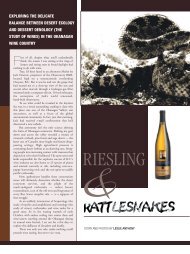Kicking the hormone habit - Canadian Writers Group
Kicking the hormone habit - Canadian Writers Group
Kicking the hormone habit - Canadian Writers Group
You also want an ePaper? Increase the reach of your titles
YUMPU automatically turns print PDFs into web optimized ePapers that Google loves.
Along with <strong>the</strong> little blue estrogen pill, I take a big white<br />
one, progesterone. Both <strong>hormone</strong>s work toge<strong>the</strong>r to regulate<br />
<strong>the</strong> menstrual cycle, and <strong>the</strong>y’re prescribed toge<strong>the</strong>r<br />
for hot-flashing midlifers like me who still have a uterus<br />
(estrogen on its own can cause endometrial cancer). But<br />
I’ve always viewed progesterone as estrogen’s humble sidekick,<br />
and no wonder. It’s estrogen that repeatedly dominates<br />
discussions of so-called combined <strong>hormone</strong> <strong>the</strong>rapy<br />
— confoundingly cast as both <strong>the</strong> key to women’s vitality<br />
and a serious threat to our health.<br />
My heart sinks whenever I read that yet ano<strong>the</strong>r study<br />
has raised a warning flag about estrogen. I keep promising<br />
myself that one day soon I’m going to kick my estrogen<br />
<strong>habit</strong>. I don’t like feeling so dependent<br />
on <strong>the</strong> stuff that I’d pay any price to<br />
replace it. But I want to be me, not a<br />
sleep-deprived wraith. I’ve made two<br />
attempts to quit <strong>the</strong> pills by gradually<br />
tapering <strong>the</strong> dose; both times I gave<br />
up within weeks. I never planned on<br />
becoming an estrogen lifer, but I seem<br />
headed that way. What am I doing to<br />
myself? In an effort to reassure <strong>hormone</strong>-phobic<br />
women, <strong>the</strong> Society of<br />
Obstetricians and Gynaecologists of<br />
Canada has declared combined <strong>the</strong>rapy<br />
“safe and effective” for relieving<br />
symptoms like mine — but only for<br />
short-term use, five years at most.<br />
It’s been 15 for me.<br />
At 45, I was <strong>the</strong> first in my circle to<br />
jump on <strong>the</strong> <strong>hormone</strong> bandwagon.<br />
The results seemed nothing short of<br />
miraculous. A few months into <strong>the</strong><br />
job of a lifetime, editor-in-chief of Chatelaine, I’d been arriving<br />
bleary-eyed at <strong>the</strong> office and barking at my staff.<br />
How could I keep this up? My doctor told me I had <strong>the</strong><br />
most treatable of problems: estrogen deficiency. Just to be<br />
sure, he gave me an estrogen injection that restored my<br />
spirits overnight, proving to his satisfaction and mine that<br />
<strong>the</strong> time had come for <strong>the</strong> little blue pill, syn<strong>the</strong>tic estrogen<br />
— supposedly a veritable wonder drug. It would protect my<br />
heart, streng<strong>the</strong>n my bones and ward off dementia while<br />
keeping my skin and vagina youthful. I started singing its<br />
praises to strung-out, middle-aged friends.<br />
Then one fateful summer morning in 2002, news broke<br />
that a major <strong>hormone</strong> trial, part of <strong>the</strong> 15-year Women’s<br />
Health Initiative (WHI) study, had been abruptly terminated<br />
for ethical reasons. Researchers had detected an increased<br />
risk of breast cancer, heart disease and stroke<br />
among women on combined <strong>hormone</strong>s. Dismayingly, women<br />
and <strong>the</strong>ir doctors had been counting on this trial for<br />
I never planned on becoming an<br />
estrogen lifer. I’ve made two<br />
attempts to quit <strong>the</strong> pills; both<br />
times I gave up within weeks.<br />
proof that estrogen lived up to its billing. Now it seemed to<br />
have proven just <strong>the</strong> opposite. I’d no sooner sat down at my<br />
desk than a friend called in a panic. No more <strong>hormone</strong>s for<br />
her! And just when did I plan to pitch my “cancer pills”?<br />
She didn’t think much of my answer: Risk is part of life and<br />
I intend to enjoy mine while I can. That’s basically been my<br />
position ever since. But I’d like to know for sure that I’m<br />
not kidding myself.<br />
You don’t hear much about long-time users like me. It’s<br />
<strong>hormone</strong> refuseniks who get <strong>the</strong> attention. They’re <strong>the</strong><br />
reason why breast cancer rates have been dropping since<br />
<strong>the</strong> WHI bombshell, according to a Harvard study that<br />
made headlines last winter. Predictably, <strong>the</strong> study has critics<br />
who cite o<strong>the</strong>r possible reasons<br />
why breast cancer rates have plummeted,<br />
but <strong>the</strong>re’s just no denying<br />
one troublesome fact: The drop occurred<br />
only in white, non-Hispanic<br />
women over 50. These were <strong>the</strong> very<br />
women most likely taking combined<br />
<strong>hormone</strong> <strong>the</strong>rapy — until <strong>the</strong>y began<br />
to reject it. In September, a <strong>Canadian</strong><br />
study made <strong>the</strong> same connection<br />
between <strong>the</strong> flight from <strong>hormone</strong>s<br />
and a marked drop in breast cancer<br />
incidence (almost 10 per cent). Good<br />
luck waiting for future research to reach a more comforting<br />
conclusion. As Nancy Krieger, an epidemiologist<br />
and lead author of <strong>the</strong> Harvard study, told Newsweek,<br />
“How can you ask women to take a drug that you know<br />
causes <strong>the</strong>m harm?”<br />
I like to think <strong>the</strong> benefits of feeling like myself more than<br />
justify whatever risks I’m taking. After all, I lead a healthy<br />
life. I’ve never smoked, I work out faithfully, I eat my quinoa<br />
and leafy greens. I’ve been slim ever since I lost my<br />
pregnancy weight at 22. All of <strong>the</strong>se things help prevent any<br />
number of diseases, including <strong>the</strong> one that women fear<br />
most — breast cancer. And when it comes to that particular<br />
scourge, an early pregnancy like mine is known to have protective<br />
effects. I’ve just about convinced myself that if medical<br />
science could put my entire health history in a test tube,<br />
shake it up and give me a score, I’d get at least an A minus<br />
for cancer prevention, never mind <strong>the</strong> <strong>hormone</strong> pills. Even<br />
so, I can’t suppress occasional flickers of unease.<br />
xx / More / December / January 2011



